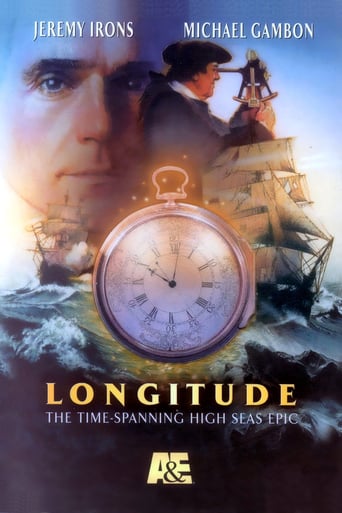SnoopyStyle
In the 18th century, latitude is readily observable but longitude is nearly impossible. The inability to find longitude is the difference between life and death. After one particularly devastating loss, the government offers £20k for a practical solution. The solution lies in a marine chronometer that can work on the rolling seas. Clockmaker John Harrison (Michael Gambon) creates such a clock as he struggles to prove his invention's accuracy. In post-WWII, Rupert Gould (Jeremy Irons) becomes obsessed with finding Harrison's clocks and restoring them to their working conditions.It's an eye opening slice of scientific and exploration history. It seems like such an unsexy slice of history but it's such an important one. Surprisingly, this movie makes it compelling. It's a great way to see into another era. Harrison is the quintessential underdog and Michael Gambon does a great job making him a socially awkward man. There is a compelling competition with the scientific old guard. Jeremy Irons' modern story isn't quite as compelling. Overall, this is very enlightening history lesson and a well-made one at that.
Sigmoid Flexure
All great stories deal with conflict and overcoming difficulties. The vast majority of films that are produced thesedays feature heros who triumph based on who is a bigger bad ass or has got the biggest guns or bombs. Here is a film that has virtually no 'action' other than a few cannons fired and a lashing or two during the parts at sea, but is filled with the sort of tension and drama that keeps the viewer constantly involved.If you enjoy intelligent movies, then you should definitely seek this film out. It sounds dreadfully boring if you read the plot summary, but it isn't. It is wonderfully written and produced and contains much light humor as well, making it truly entertaining.One film that it reminded me of is "Master and Commander" because of the similar scenes of the British navy and the theme of the struggle of science and progress in the face of war and politics with intelligence and perseverance winning out in the end.The interwoven story of Rupert Gould is just as interesting and provides an artistic counterpoint to the main story. Again, we have the story of a man who continues with his work in spite of numerous obstacles of the most serious magnitude because he knows that the world will be a better place as a result of that work.The film is long and you should wait until you have enough time to sit down and watch it through to the end because once you begin you will have difficulty turning it off.
lllama
This film was absolutely stunning, and after watching it we were amazed at how quickly the time flew. Though the entire movie (DVD) was 200 minutes long, we felt as though it had taken less than an hour. The sets and costumes were beautiful, the acting was superb, the meshing together of the two different times worked extremely well, the "timing" was impeccable, the tension built wonderfully, and the climax was powerful. We never dreamed we would feel so strongly about a movie depicting what we originally thought would be a mundane, boring subject. We are grateful to the makers of this film for the attention to detail and the feeling they put into this movie. It came alive for us, and we now feel more appreciative toward those geniuses of former times who persevered against all odds to improve the human condition. Kudos to Michael Gambon and Jeremy Irons for their exquisite performances of complex characters, and for the depth of feeling they both portrayed.
TxMike
Dec2004 update: I did eventually buy the DVD set, and it is very nice."Longitude" is a towering achievement as a movie. Shown in 4 hours on A&E network, I taped it to skip the commercials and was able to watch it in just over 3 hours. I only give ratings of "10" to truly remarkable movies, and this is one. It helps to be a scientist, and to have had a life-long fascination with navigation and timepieces.The story is historical - the British government passed an act in the early 1700s for a prize of 20,000 Pounds for the first to provide an accurate and practical means of establishing longitude at sea. A Board of Longitude,comprising self-important scientists, would judge when the challenge was met.John Harrison, a carpenter who understood the sun's apparent movement with the Earth's rotation, figured you could do it with a very accurate clock. He, with help from his son William, did it over a period of about 50 years, and met all conditions with his 4th clock, but the board kept throwing up roadblocks to avoid giving the award to someone who was not a scientist but a mere "carpenter." Finally, when Harrison was 80, ironically in the year 1776, was given the prize by Parliament. He died only two years later.The ancient story was interwoven with a WWII-era story of a man, played by Jeremy Irons, who undertook to restore all of Harrison's old clocks, and finally succeeded against similar resistance that Harrison had faced.If you either are not a scientist, or do not appreciate the magnitude of Harrison's effort, and its contribution to modern navigation, then it is possible that you would find this movie somewhat boring. Do yourself a favor - don't waste your time. For me, it remains one of the absolute best movies I have ever seen, both in significance of the story and the mastery of the acting and direction.


